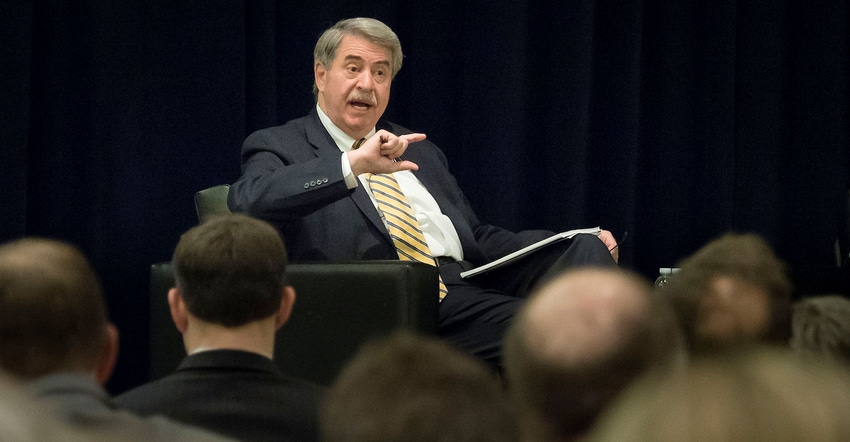USDA trade undersecretary Ted McKinney says focus is on NAFTA before moving forward with other bilateral agreements.

U.S. Department of Agriculture trade undersecretary Ted McKinney opened the second day of the Agricultural Outlook Forum by outlining his priorities for trade. He said he feels “bullish” that key trade deals that benefit U.S. agriculture will get closed, including the North American Free Trade Agreement (NAFTA) and even a bilateral trade agreement with Japan.
Many agricultural groups have sought a bilateral deal with Japan because of the advantageous opportunities that exist with the major buyer of U.S. products. McKinney said while he doesn’t know what the agreement with Japan will look like, it’s not a matter of if but when something will come.
As Japan moves forward with the remaining 11 countries in the Trans-Pacific Partnership (TPP), McKinney acknowledged that timing is critical. President Donald Trump withdrew from TPP in his first days of office. However, as the other TPP countries have wrapped up a renewed deal without the U.S. in recent weeks, Trump has said not once, but twice, that he could reconsider re-entry into TPP if it was renegotiated, which McKinney said is encouraging.
Whether trade with Japan advances through TPP or a bilateral deal, McKinney said he speculates that the world is watching how NAFTA plays out. “We’ve got to get through NAFTA first and then get on to the others,” McKinney said. “I’m an advocate of sooner rather than later.”
Much of the focus in ongoing NAFTA negotiations centers around getting a deal wrapped up before the July elections in Mexico. McKinney said both candidates understand the importance of the trading relationship with the U.S.
“My read is that the relationship between the United States and Mexico is not only strong but quite strong. I think we can get there with Mexico on NAFTA,” he said. However, just like any discussion, there are some difficult issues to work through.
McKinney re-emphasized that trade is a two-way street, noting, “If you are only speaking of exports, it brings on a selfish view.” However, this is the view being pressed by the U.S. Trade Representative and others in the Administration with the emphasis on trade deficits.
McKinney said he and others at USDA have been very vocal that trade agreements have been good for agriculture and can continue to be – sometimes using a gentle whisper and other times with a turbo-charged megaphone.
McKinney said he’s well on his way to joining the million-mile club in traveling around the globe to open up new markets as well as enhance relationships with current trading partners. His philosophy is to “leave no stone unturned.”
Late on Feb. 22, he returned from his second mission trip to India, which he said was an all-time high in terms of new business attendees came away with. Then, on Feb. 26, McKinney plans to leave for a trade mission to Guatemala, and 48 hours later he will head to Japan.
McKinney will lead the trade mission with a delegation of agribusiness and state government leaders seeking to grow U.S. agricultural exports to Central America’s Northern Triangle countries of Guatemala, Honduras and El Salvador.
Since implementation of the U.S. and Central American Free Trade Agreement-Dominican Republic (CAFTA-DR) in the Northern Triangle in 2006, U.S. agricultural exports to El Salvador, Guatemala and Honduras have doubled, totaling $2.2 billion in 2017. In all three countries, rising gross domestic product and rapidly expanding urban and middle-class populations are expected to lead to continued growth in demand for food and farm products over the coming decade.
“The Northern Triangle offers significant market opportunities for exporters of U.S. farm and food products,” McKinney said. “Thanks to population and economic growth in the region, demand for imported goods – particularly high-value, consumer-oriented food products – is on the rise, and more than 95% of U.S. agricultural exports enjoy duty-free access to the region under the CAFTA-DR trade agreement.”
While the mission will be based in Guatemala, participants will also connect with importers from El Salvador and Honduras who are traveling to Guatemala. In-country staff from USDA’s Foreign Agricultural Service will arrange nearly 450 one-on-one business meetings between U.S. delegates and representatives from local companies interested in purchasing U.S. products.
Although every country isn’t a “home run” like China, which will buy massive amounts of U.S. agricultural products, McKinney pointed out that sometimes it's important to get the singles and doubles represented by the smaller or new markets, which offer the opportunity to sustain and grow current markets like Japan, China and NAFTA markets.
“We’re going to try and get more singles and doubles. We’re going to chase all those as aggressively as we can,” he said.
In a panel earlier in the Agricultural Outlook Forum, Joe Stone, Cargill corporate vice president and director, praised those at USDA who have been “relentless champions” in explaining the role trade agreements play in advancing agricultural trade as well as delivering a revised NAFTA.
He pointed out that South Korea's beef consumption has surged 25% since 2010, when the U.S. signed a trade agreement with the nation. Koreans eat more U.S. beef per capita than consumers in any other market.
There are a billion or more consumers who are right at the income level of $2,000-10,000, where they’re looking to add protein and variety to their diets as their income improves.
“Global trade is absolutely key contributor to achieving lofty goals. Let’s rally as an industry around productive trade agreements to ensure we can continue to lead with prosperity for generations to come,” Stone said.
About the Author(s)
You May Also Like




.png?width=300&auto=webp&quality=80&disable=upscale)
